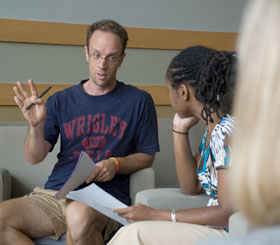  |
| HOME | THIS ISSUE | CALENDAR | GRANTS | BACK ISSUES | < BACK | NEXT > |
Advising roundtable focuses on how to help students in crisisby Sherry Fisher - October 15, 2007 | ||||
| “Working with students in crisis for me can be both the most challenging and rewarding experience I have as an advisor,” says Assistant Vice Provost Steve Jarvi, director of UConn’s Institute of Student Success. Jarvi spoke Oct. 5 at an advising roundtable talk about working with students in distress. The event, held in the Student Union, included presentations about campus resources. Facilitators also led small groups in discussions and role-playing activities to help advisors be more effective in working with students in crisis. “Sometimes, students want to take me beyond my comfort zone” Jarvi said. “They want to talk about how they feel, their family, their relationships, and any number of topics that have nothing to do with general education requirements.” He said that while he is honored that students seek his counsel on personal matters, he is also “panicked. I’m afraid that I won’t respond appropriately.” Advisors, counselors, faculty, and others at the University have expressed the same concerns about dealing with students’ personal issues. Especially in the wake of the killings earlier this year at Virginia Tech, UConn officials wanted to bring together a group to talk about the best ways to work with troubled students; hence the roundtable discussion. This year’s event drew an audience fo more than 120 people. Lee Williams, dean of students, said since the Virgina Tech tragedy, offices at UConn have been questioned about how information is shared regarding students who cause concern. Williams said information about such students comes from “across campus and beyond. These are often staff, parents, and other students who are calling someone to say, ‘I’m a little worried about this student because he or she seems very depressed,’ ‘their academic performance has dropped off,’ ‘their behavior in my classroom is bizarre,’ or ‘this is my roommate and I’m really not sure what to do.’” Williams said information about students of concern is shared with a group of people representing several departments, including alcohol and other drug services; residential life; Student Health Services; Counseling and Mental Health Services; the Center for Students with Disabilities, the Office of the Dean of Students, and the UConn Police. A group meets every week to talk about students whose behavior has raised concern. The police are not usually part of the weekly discussion, but are called in certain instances. Sometimes parents are called, Williams said. Occasionally someone will talk with the person who raised the concern. “If it’s a roommate relationship problem, we might suggest talking to the Community Assistant,” she said. Barry Schreier, director of Counseling and Mental Health Services, said, “The stronger we can build a network around our students, the better off our campus will be.”
He said people involved with a student in crisis need not handle the situation alone. “Consult. You are not an island,” he said. “Even if the student is sitting there, get assistance. Do too much rather than too little. I’d rather apologize for having done too much than have to apologize because I just didn’t do enough, and something went wrong.” Schreier’s advice was to “engage with the student and accept what they are telling you.” He said if a student says they’re fine, check it out further. “If you’re nervous, it’s a perfectly responsible response. I get nervous all the time. Practice makes comfort. The more you practice, the more comfortable you’ll be. “Remember, you’re on the front line,” he said. “The job is to refer – to engage folks in the network.” Schreier encouraged the audience to call Counseling and Mental Health Services, or have a student call. “The more you demystify us, the more they’ll come over to us,” he said. If there is imminent danger, a student can meet with a counselor on the same day, Schreier said. Sometimes a student is referred out to the community, and sometimes a medication referral is made. Schreier said confidentiality is of the utmost importance. There is always a balance between protecting the civil liberties of the individual and providing civil protection for the community, he said. “Privacy saves more lives than it’s ever going to cost,” he maintained. “Because we are known for keeping confidentiality, people come to us.” Donna Korbel, director of the Center for Students with Disabilities, said her office has a special relationship with students. “We have lots of information about the needs of students, even before they come to campus,” she said. Maj. Ronald Blicher of the University Police encouraged people to call them. “Don’t think that every time we respond, somebody is going to get in trouble. It’s not true,” he said. “We will ask questions, we might make an agency referral, we might call for medical transportation.” Know the services that are available on campus, he advised. And above all, “Trust your instincts.” |
| ADVANCE HOME UCONN HOME |

